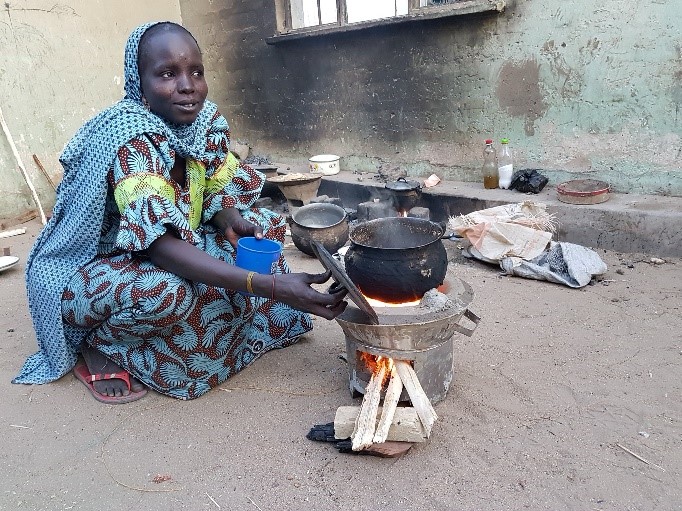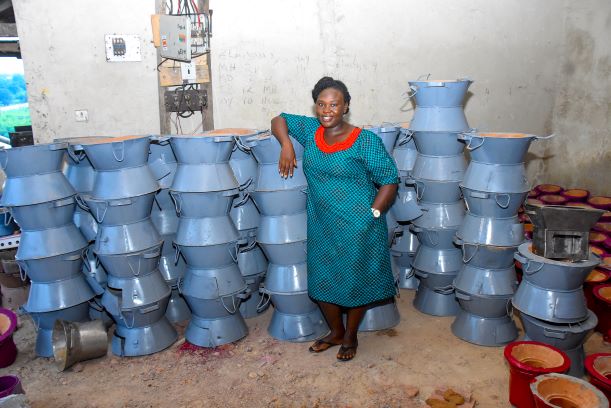Women Energizing Change Series: How Technology Can Offer Solutions in a Time of Social Distancing
Seven years ago, Nigeria’s clean cooking industry was both smaller and more male-dominated than today. But that didn’t stop entrepreneur Happy Amos from founding her own cookstove manufacturing company. Since starting Roshan Global Services in 2013, Amos, who is also the Managing Director of the company, has sold over 20,000 “Happy Stove” cookstoves. Amos has recruited more than 60 women as sales agents across Northern Nigeria and has trained over 350 women, including refugees, on the negative impacts of cooking with fuels like wood, charcoal, and animal dung.
With Nigeria’s COVID-19 health and safety policies prohibiting large gatherings, Amos and her team have had to rethink their sales and marketing approaches. A finalist for the Clean Cooking Alliance’s 2019 Woman Entrepreneur of the Year Award, Amos shared how she is using creative strategies to reach customers and meet the ongoing demand for clean cooking solutions.
This interview is part of a series showcasing women entrepreneurs in the clean cooking sector.
Following the outbreak of COVID-19, Roshan Global Services (Roshan) Founder and Managing Director Happy Amos has had to implement new business strategies to remain operational. The pandemic required limits on the number of people allowed to congregate, and clean cooking companies were unfortunately denied the “Essential Service” status needed to continue in-person activities.
Fortunately, digital communications have become a successful solution for Amos. She explained that she and her team have transitioned to online operations in order to cut down on face-to-face interactions which is helping to keep employees safe and healthy.
“Everything – from our managerial activities to finance to our communications – is online now except for the production team,” says Amos. “COVID-19 has forced us to become more comfortable and familiar with technology [such as video conference programs and social media].”
Today’s social distancing policies have also impacted how Amos conducts sales and customer outreach. Before COVID-19, Amos used community demonstrations as her core marketing approach. These events were opportunities to educate the public on the benefits of clean cooking, while also showing customers how to properly use Happy Stoves.
With community activities no longer an option, Amos has turned to digital platforms such as Facebook and WhatsApp to hold demonstrations and training sessions for many of her customers.
This creative use of digital marketing has helped Amos stay connected to her customer base during the pandemic, she explained. She has even been recruiting her friends and other women in her network to share videos and testimonials of Happy Stoves on their own social media accounts.
“Since we’ve started using Facebook as a sales platform, my friends – and even my friends’ friends – have started selling Happy Stoves for me,” Amos explains. “So far our customers are responding well to the replacement of physical contact with online campaigns.”
To carry-out these digital marketing campaigns, Amos records herself cooking with a Happy Stove while discussing its benefits, such as its efficiency and user-friendliness. Then, she sends these videos directly to her contacts or posts them to her WhatsApp and Facebook statuses in order to reach a wider audience. “These videos have convinced a lot of people to buy Happy Stoves,” says Amos.
Amos shared another benefit of digital marketing: Its ability to provide an additional source of income to the women promoting her stoves without having to leave their homes.
“They are able to make commission, which is great because families are trying to find alternative sources of income or ways to save money right now,” explained Amos.
A younger sister of one of Amos’s friends who had lost her office job due to the pandemic began selling Happy Stoves via WhatsApp. She ended up selling about 50 stoves, earning her N 25,000 (USD $65).
“More people are seeing [digital cookstoves sales] as a viable means of earning income,” says Amos. “I see it as a win-win: Roshan sells more stoves and people in my community get to earn extra money.”
But acquiring an improved cookstove cannot provide the health and financial benefits it promises if there is not a consistent and affordable fuel supply available to customers.
Until now, Amos and her team have solely focused on cookstove manufacturing while maintaining relationships with fuel producers. However, due to business closures resulting from COVID-19, many briquette companies in Nigeria and elsewhere have halted or slowed operations. To address this, Amos has begun investing in efforts to produce briquettes in-house.
Despite the unforeseen challenges of COVID-19, Amos continues to emphasize the importance of her company’s work.
“As a leader in the sector, I’m working to stand as a beacon of hope for my employees, customers, and other community members,” says Amos. “It’s crucial we find alternative and safer ways of doing things. This is a time for us to push harder to achieve our mission.”
Amos continues to spread awareness about the benefits of clean cooking and is calling on greater support from governments and investors to ensure that more people have access to cleaner and more efficient stoves and fuels. This is especially important now as research suggests that pre-existing respiratory illnesses from exposure to household air pollution can lead to more deadly cases of COVID-19.
“This is not the time for investors and donors to shy away from the sector,” said Amos. “People will always cook, so these issues are still here.”



